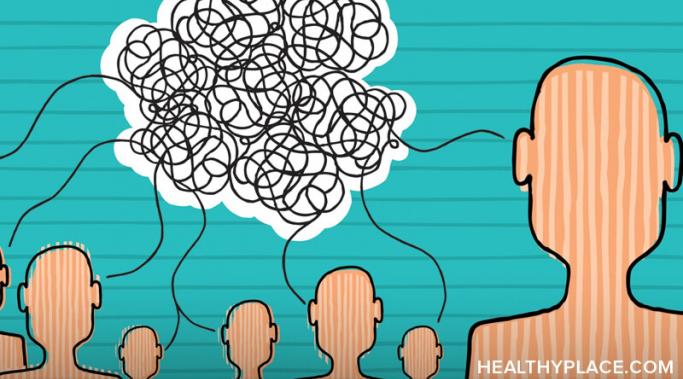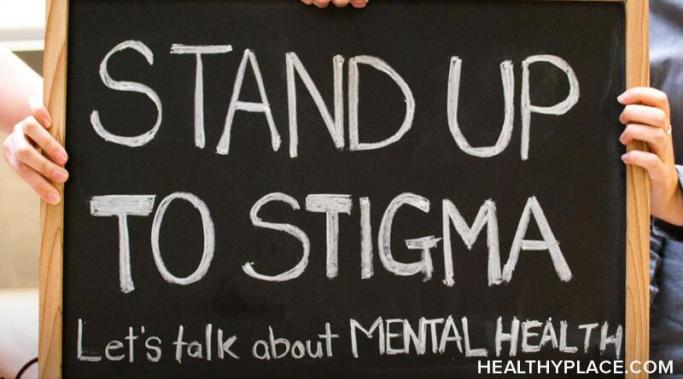Sometimes when we think about how to stand up to stigma about mental health, I think we get too caught up in the idea of an outward battle against mental health stigma. We might forget that we can arm and armor ourselves against it. As I've written before, mental health stigma may never go away, so it's about equipping and molding ourselves to better be able to withstand it. It doesn't just happen with a snap of our fingers though; it's a process to take on and continuously work at. If you're needing encouragement or guidance to stand up to stigma, here are some things you can try.
How to Combat Stigma
The effect of exercise on mental health and mental illness isn't what most people think. One of the go-to remedies for those who don’t understand mental illness is to suggest those who have a mental illness exercise as if it’s a cure. It’s often used in the argument that pharmaceuticals are bad by saying regular exercise is the only real cure. While being active can have a positive effect on some people, it’s still not a cure for mental illnesses. Because of that, the suggestion of exercise to fix them is very much a notion of stigma because of its oversimplification and misunderstanding of mental illness.
Is it possible to destigmatize mental illness by refusing to use the word "stigma?" If you’re having a discussion about mental illness, it’s almost inevitable someone will mention stigma. When talking mental health, stigma refers to the misinformed perceptions and ideas about mental illness and those with it. It’s a big component in why people feel ashamed to have a mental illness and suffer in silence instead of seeking mental health treatment and understanding that mental illness is just an illness. Since there is still widespread misinformation, it’s not surprising the word "stigma" comes up often. What is surprising, however, is that there are those who say stigma does not exist, we should stop using the word "stigma," and I’ve even seen the claim that it’s offensive. Can we destigmatize mental illness by not using the word "stigma?"
I’ve begun to wonder if current mental health awareness efforts are enough to fight stigma. The word "awareness" in relation to mental illness has a strange effect on me these days. On the one hand, I think awareness is great for helping people better understand the realities of mental illness and the people who live with it. On the other, I feel the word itself feels tired, overused, and almost ineffective as it seems to appear in many places, but somehow manages to lack the impact it could have. I'm not sure if mental health awareness efforts are enough.
Dehumanizing people with addiction is something many people do without thinking about it. For example, when someone says “addict,” there are probably a few images that readily come to mind and descriptors to go along with those images — crackhead, drunkard, nasty, degenerate, the list goes on. This is the stigma of mental illness at play as preconceived notions and dated ideas of what it means to have an addiction take over our perception. When we let that happen, we’re dehumanizing people with addiction. This happens with all kinds of addiction, too.
How we ask about a person's mental illness matters because language can stigmatize mental illness. At the core of stigmatizing mental health conversations, is the idea that mental illnesses are not real, legitimate illnesses. It’s one of the basics when talking about mental illness, and to some degree, it seems like we should be well past this statement by now. But we’re not. It’s not just naysayers of mental illness that make the mistake, either; in some cases, even those who have mental illness or know someone who does still don't know what to say to someone with a mental illness. They seem to want to think of mental illness as something other than a sickness and end up contributing to stigma in the questions they ask about a person's mental illness.
While social media can be a great outlet for raising mental health awareness, oversharing your mental illness struggles may attract unwanted stigma. Usually, this comes from people who already have preconceived, stigmatizing ideas about mental illness. Even so, oversharing your mental illness details online can actually generate more stigma. It turns out there may be a fine line between raising mental health awareness and oversharing your mental illness struggle.
Awareness weeks for mental health are critical. The sheer mention of an awareness week of any sort may already have you groaning. I know I’ve heard and seen comments from people complaining about how there’s an awareness week for everything. That could be true, but they’re a vital part of the dissemination of information and breaking down stigmas associated with whatever cause they’re for. For causes such as mental illness awareness, awareness weeks are an especially poignant way to demystify what mental illnesses are and are not.
Although I understand the huge amount of frustration that comes from responding to mental health stigma, I also feel that there are two ways to handle irritation. One way is getting mad, worked up, and starting to sling names, threats, and sarcasm around like there’s no tomorrow. The other is to approach these stigmatizers with a level head and facts, and knowing when to disengage. In the world of the Internet, it’s pretty easy to go about the former, but in this blog, I’m going to explain why I think the latter is a much more effective way to respond to mental health stigma.
Mental illness stigma in school is a reality. Depending on where you live, school may already be back in session after the summer break or you could be waiting for that first day back to school in early September. Whatever the case, back-to-school can be a tough time for kids with mental illness whether it’s personal challenges of getting through the day or the challenge of dealing with peers. Even if your child really enjoys academics, back-to-school might cause distress. I know it did for me, so I want to offer a few tips for dealing with mental illness stigma in school since that’s what I was often most worried about.









